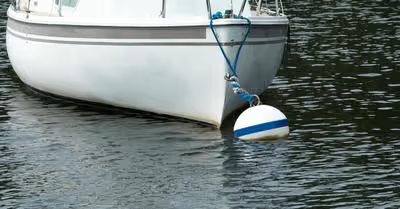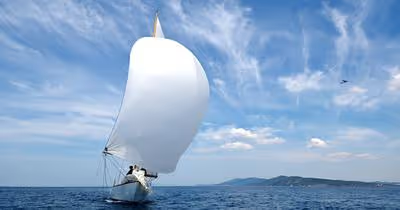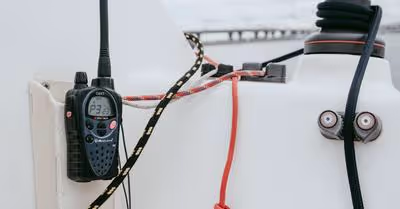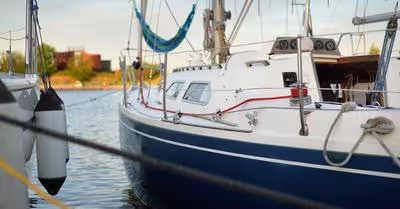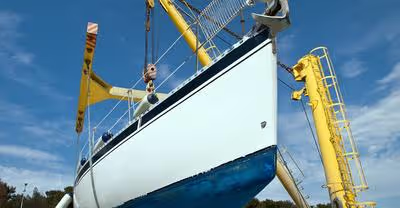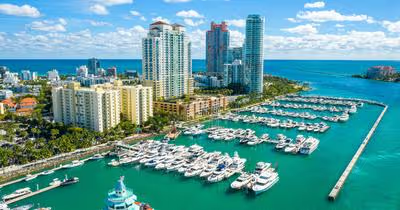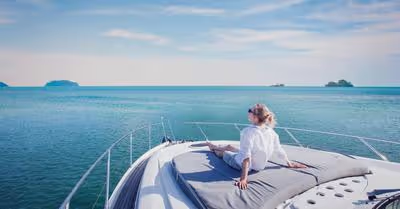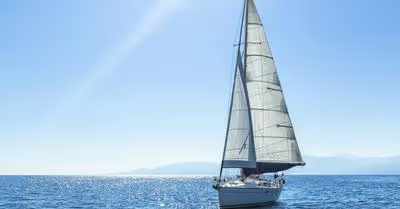Table of Contents
How to Choose a Boat Trailer
You should consider the following aspects when buying a trailer for your boat.
What is Your Boat Length?
Your boat length directly impacts your trailer choice. When selecting the trailer, you should consider the bow eye to drain plug measurement of the boat. Many manufacturers add the length of bow pulpits and swim platforms to the boat's overall length. Contrary to popular belief, you should not add these to the overall boat length.
The manufacturer's guide is perfect for determining your boat's valid overall length. However, most boat owners don't have their manuals since many are decades old. In that case, you can check your boat details through authentic online sources or ask your dealer to measure the boat and recommend the right trailer.
Trailer Load Capacity
Every trailer has a maximum weight rating consumed mainly by the boat's weight. Besides the boat, this weight also considers the engine, gear, or anything else you will be carrying on the trailer. Unfortunately, most boat manufacturers establish the boat's dry weight as its total weight. But you should consider the wet weight, including fuel, water, motor, etc.
While this is wrong information on the manufacturer's part, it is only in your best interest to determine the actual net weight of the boat to ensure you get the right trailer. We also recommend getting a trailer with 10-15% extra weight capacity for safety.
Tongue Weight
The tongue weight is the weight on the front of the trailer. The ideal tongue weight should not be more than 15% of the total weight of the trailer and boat. If the weight is greater than that, you will probably risk your and your boat's safety as the weight can disbalance the trailer and cause accidents.
Bunk Trailers or Rollers Trailers?
Boat trailers are available in two designs: Bunk trailers and Roller trailers.
Bunk Trailers
Bunk trailers are the more straightforward and minimalistic kind. If you want to save the cost of the trailer, these are for you. The bunk trailer features plain bunks providing an easy drive-on feature for the boats to load and unload quickly. Less functioning and moving parts mean less repair and maintenance costs and extended wear.
On the other hand, you have to drive the trailers deep into the water to load and unload the boat on a bunk trailer. This risks damaging the gear, axles, brakes, and other trailer components alongside your vehicle. The damage can be more extensive and quicker in saltwater.
Roller Trailers
Roller trailers are considered more versatile and allow easy loading and launching, and are recommended for shallow water usage as they do not need to drive in deep waters. Unlike the bunk trailer, there is no rust or other damage to the trailer due to the water. However, roller trailers are more expensive due to more mechanisms.
As you can see, both types of trailers have their pros and cons. Roller trailers are the obvious choice if you want effortless launching and loading and if you are not on a tight budget. You should get the one that suits your needs best.
Aluminum or Galvanized Steel Frame?
The trailer material is another vital aspect you must consider. Whether bunk or roller, the suitable material is important to determine your towing experience.
Aluminum Trailers
Aluminum trailers are lightweight and easy to operate and carry. They also are more durable as they do not rust. Aluminum trailers are prone to corrosion, but you get good value for your money after a considerable long time. Not just that. Another massive advantage of aluminum trailers is that they put less load on the vehicle, hence, better fuel economy. For these reasons, aluminum trailers are the more popular choice.
Galvanized Steel Trailers
Galvanized steel trailers steal the show by protecting the brake lines and light wiring within the tubes. Unlike aluminum trailers, they corrode less but are prone to rust. However, galvanized steel trailers are heavier than the aluminum ones, so owners typically avoid getting them as the load can be more than the vehicle's two capacity and result in poor fuel efficiency.
Torsion or Spring Suspension?
Reliability and stability are two crucial things to make the boat towing more secure and smooth. Both torsion and spring tension has shown their trustworthiness on various occasions. You should make the more suitable choice by understanding them comprehensively.
Torsion
Torsion axles are connected to both sides of the wheel and consist of thick rubber cords running inside the axle tube. The torsion for each wheel reacts independently when the wheel moves due to rolling over a bump or a pothole. This creates a balanced wheel suspension and smoother riding experience.
As the torsion axles are attached directly to the frame, fewer moving parts mean minimum wear and tear and less repair and maintenance costs. The downside of torsion axles being connected to the structure is that the impact is distributed to the whole wheel, so it might cause more damage to other components. Moreover, torsion axles cost more than spring tension.
Spring Tension
Leaf springs have been here longer than torsion and still running. However, their use is limited to mostly off-road and heavy-duty vehicles such as trucks, trailers, etc. Spring tension is cheaper, durable, and more reliable, especially considering rougher and uneven patches.
On the downside, spring tension suspension systems require more maintenance since they are literally layers of metals attached. However, it will be long before you need to replace them. Consumers' primary concern regarding them is their bouncy nature on bumpy roads when empty. This can disturb your driving experience.
Brakes
While the brake requirements vary from state to state, most states require trailers to have brakes if the combined weight of your trailer and boat is more than 3000 lbs. Ideally, having brakes in the trailer is always better for safety as they keep your truck, boat, and trailer safe during sudden stops. You should check your state's laws for trailer brakes before buying the trailer.
Lights
Lights are critical when buying a trailer. They keep you and other people safe as they won't be able to see your vehicle's brake lights. Although you can find trailers with incandescent lights, you should get the one with LED lights as they are more robust, shockproof, and brighter. Don't worry about the water interfering with the trailer lights. These are waterproof and mounted with sealed gaskets. However, LED lights are more expensive than incandescent lights.
Tires
You need to pay special attention to the tires when buying a boat trailer. Boat trailers have special tires, more commonly known as ST tires. While the dealer should have the ST tires when showing you the trailer, it is better to be safe, so check them yourself and ask for their warranty. ST tires are specifically made for trailers. They are smaller but can carry extensive loads.
The trailer can have ST radial tires, which are better for smaller load trailers, depending on the load capacity. These have better traction, resulting in a safer towing experience and even tread wear.
Tow Vehicle Capability
The last thing you must consider for a boat trailer is its compatibility with your vehicle. If your vehicle has a lower tow capacity than the combined weight of the trailer's GVWR and the boat, there is no point in buying a cheaper trailer, resulting in wasted time and money. To ensure compatibility, verify your vehicle's tow capacity, the trailer GVWR, and the boat's LOA from their respective manuals.
Recent Articles




